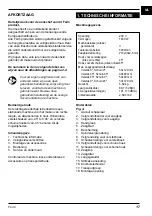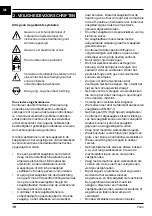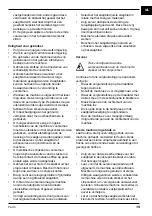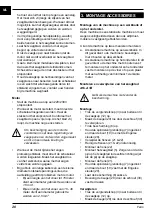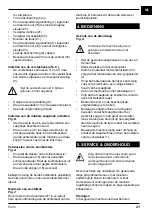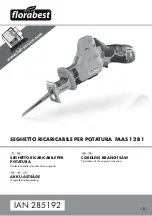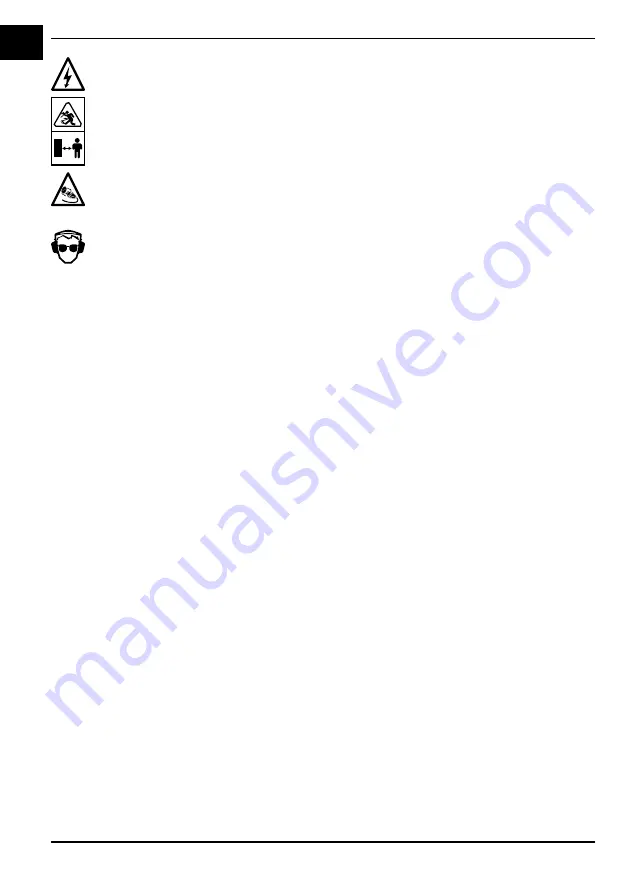
GB
6
Ferm
Indicates electrical shock hazard.
Keep bystanders at a distance
Immediately unplug the plug from the
mains electricity in the case that the
cord gets damaged and during
maintenance
Wear eye and ear protectors
Before eache use of the saw
Check the machine. If any part of the machine is
missing, bent or in any other way unusable, or
when an electrical defect occurs, turn the machine
off and take the plug out of the socket. Replace all
missing, damaged or defective parts before using
the machine again.
To fix the saw blade in the slot and to prevent
•
the piece of work from moving, follow the
instructions below.
Choose a suitable saw blade for the work.
•
Use the crosscut saw only for sawing wood
and wood derivatives or light metal such as
aluminium. Other materials can jump away or
get caught in the saw blade or give rise to
other dangers.
The arrow marked on the saw blade, which
•
indicates the direction of rotation, must point
in the same direction as the arrow marked on
the machine. The saw blade teeth must point
downwards on the front of the saw.
Check that the saw blade is sharp,
•
undamaged and correctly aligned. After
unplugging the machine, push the saw hood
downwards. Rotate the saw blade by hand
and check that it revolves freely. Put the
machine in the 45° position and check free
rotation again. If the blade touches anything it
must be adjusted.
Keep the saw blade and the clamping surface
•
for the clamps clean.
The saw blade flange must always be
•
mounted with the notch tightened towards the
saw blade.
Check that all tensioning devices and locks
•
are secure and that no part has too much play
in it.
Never just use your hands for sawing.
•
Always press the piece of work firmly against
•
the stop, so that it cannot tilt or turn while
sawing. No impurities must gather underneath
the piece of work being sawn.
Make sure that the piece of work cannot move
•
after being sawn, for example because it is
not completely supported by the surface of
the machine.
For sawing pieces of work that are not
•
supported by the full surface, use some
padding or another machine.
Replace any worn-out table inserts.
•
Only use saw blades recommended by the
•
manufacturer (EN-847-1).
Never use HS (High Speed) saw blades.
•
Check that the sawn off bits can be removed
•
sideways from the saw blade, otherwise they
can get caught on the blade and flung about.
Never saw more than one piece of work at the
•
same time.
Be extremely careful when sawing large, very
•
small or awkward pieces of work.
Be careful when sawing double mitre joints.
•
Use additional supports (tables, sheer-legs
•
and the like) for long pieces of work that can
tip over and topple off the machine if they are
not properly secured.
Never use the machine to saw pieces of work
•
that are so small that they cannot be secured
safely.
When sawing profile sections the work must
•
be carried out such that the piece of work
cannot slide away and the saw blade cannot
become jammed. A profiled piece of work
must lie flat or be held in place by an
attachment so that toppling or sliding during
the work is prevented.
Round pieces of work such as tubes must be
•
well secured, otherwise these can revolve and
the danger exists that the saw blade catches
in them. Always keep the piece of work on the
table and against the stop using a suitable
accessory or attachment.
Make sure that the piece of work does not
•
have any nails or other foreign objects in it.
User safety
Make sure you have a clean and tidy working
•
environment.
Make sure the working environment is well lit.
•
The user of the machine must be instructed in
•
the use, adjustment and operation of the
machine.

















